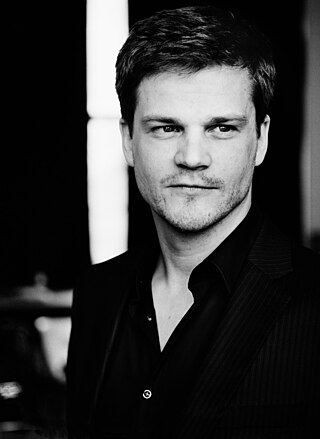Related Research Articles

Bavaria, officially the Free State of Bavaria, is a state in the southeast of Germany. With an area of 70,550.19 km2 (27,239.58 sq mi), it is the largest German state by land area, comprising roughly a fifth of the total land area of Germany, and with over 13.08 million inhabitants, it is the second most populous German state, behind only North Rhine-Westphalia; however, due to its large land area, its population density is below the German average. Major cities include Munich, Nuremberg, and Augsburg.
Helmut Dietl was a German film director and author from Bad Wiessee.
Joseph Vilsmaier was a German film director who began his career as a technician and cameraman. He is internationally known for films such as Comedian Harmonists.

Bernd Eichinger was a German film producer, screenwriter, and director.

Bayerischer Rundfunk, shortened to BR, is a public-service radio and television broadcaster, based in Munich, capital city of the Free State of Bavaria in Germany. BR is a member organization of the ARD consortium of public broadcasters in Germany.

The German Film Award, also known as Lola after its prize statuette, is the national film award of Germany. It is presented at an annual ceremony honouring cinematic achievements in the German film industry. Besides being the most important film award in Germany, it is also the most highly endowed German cultural award, with cash prizes in its current 20 categories totalling nearly three million euros.

Monika Baumgartner is a German television actress and theatre director. In her roles, she usually plays typical characters from Bavaria.

The Nymphenburg Porcelain Manufactory is located at the Nördliches Schloßrondell in one of the Cavalier Houses in front of the Nymphenburg Palace in Munich, Germany, and since its establishment in 1747 has produced porcelain of high quality. It is one of the last porcelain producers in the world where every single part is made entirely by hand.

Eva Mattes is a German-Austrian actress. She has appeared in four films directed by director Rainer Werner Fassbinder. In A Man Like E.V.A. (1984), she played a bearded film director, based on the recently deceased Fassbinder.

Kai Wiesinger is a German actor.
The Bavarian Film Awards have been awarded annually since 1979 by the state government of Bavaria in Germany. They are among the most highly regarded awards for filmmaking achievement in Germany. There are several categories for actors and actresses.

Benjamin Herrmann is a German film producer and distributor.

The Bavarian Order of Merit is the Order of Merit of the Free State of Bavaria. It is awarded by the Minister-President of Bavaria as a "recognition of outstanding contributions to the Free State of Bavaria and the Bavarian people".

The Bavarian Maximilian Order for Science and Art was first established on 28 November 1853 by King Maximilian II von Bayern. It is awarded to acknowledge and reward excellent and outstanding achievements in the field of science and art. From 1933 onwards the order was no longer awarded, until 1980 when it was reinstated by the then Minister-President of the Free State of Bavaria Franz Josef Strauß. Munich jewellers Hemmerle have been responsible for making the medal since 1905.

Haindling is a German band founded in 1983 by Hans-Jürgen Buchner. The band specializes in Bavarian world music, a mixture of different musical styles such as pop, rock, folk, ambient, jazz and classical music. Most of the songs are written in Bavarian language. Haindling is famous for instrumentals and film scores composed by Buchner. The name of the band derives from the small village Haindling within the town of Geiselhöring in Lower Bavaria.

The Hof International Filmfestival is a German film festival that takes place in Hof, Bavaria, every year in October. Apart from numerous foreign productions, the main focus traditionally is on German films. During six festival days, about 130 films are shown in 8 theaters of 2 cinema centers, adding up to a total of 200 individual film presentations. With the exception of the retrospective, all films are German or world premieres.

Sigmund Graf von Haimhausen was a Bavarian aristocrat, mining operator, head of the Bavarian Mint and Mines commission, porcelain manufacturer and first president of the Bavarian Academy of Sciences.

FilmFernsehFonds Bayern is a company whose goal is to promote media in Bavaria, Germany. The fund has its headquarters in Munich.

The following outline is provided as an overview of and topical guide to Munich:

Wiedemann & Berg Film is a German film production company founded by Quirin Berg and Max Wiedemann in 2003. The company's first movie The Lives of Others won the Academy Award for Best Foreign Language Film in 2007.
References
- ↑ "Bayerischer Filmpreis". Bayerisches Landesportal (in German). 9 October 2017. Retrieved 13 November 2020.